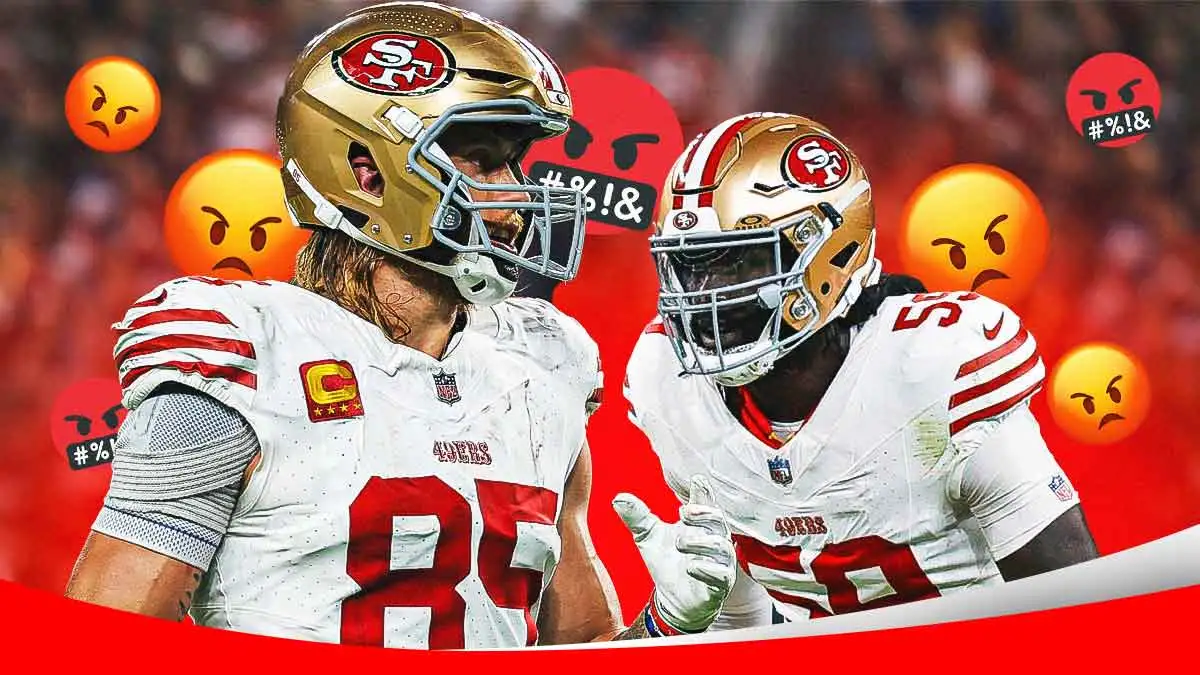The San Francisco 49ers’ loss to the Los Angeles Rams on Thursday night in Week 15 was a painful one, with playoff hopes hanging by a thread. While the game itself was tough to digest, especially with quarterback Brock Purdy struggling in the heavy rain, the real story came from linebacker De’Vondre Campbell’s actions on the sideline. His decision to quit on his team midway through the game became the center of attention, overshadowing the on-field performance of the players.
In the third quarter of the game, with the score still close, Campbell decided to refuse to enter the game. According to head coach Kyle Shanahan, Campbell simply said, “I didn’t want to play today.” After making this declaration, Campbell walked off the field and into the locker room, effectively abandoning his teammates in the middle of the contest. This dramatic move was completely unexpected and left the 49ers’ defense scrambling to adjust without a veteran leader.
George Kittle, one of the 49ers’ key offensive players, was visibly upset by Campbell’s decision. In an interview after the game, Kittle didn’t mince words, calling Campbell’s actions “very dumb, very stupid, very immature.” He further emphasized his disbelief by questioning how anyone could do that to their teammates. Kittle, known for his leadership and intensity on the field, expressed that this kind of behavior was not acceptable, especially at such a critical point in the season.
The emotional toll of Campbell’s actions didn’t stop with Kittle. Cornerback Charvarius Ward also shared his frustration with Campbell, calling his departure from the game “some subtle s**t.” Ward’s reaction was blunt and pointed, explaining that Campbell’s decision to leave in the middle of the game hurt the team and its chemistry. Ward felt strongly that Campbell should not have dressed for the game if he didn’t intend to play, suggesting that his commitment to the team was questionable.
Ward also didn’t hesitate to predict the outcome of Campbell’s actions. “He probably gonna be cut soon,” Ward remarked, highlighting the severity of the situation. For a veteran player like Campbell, his behavior could have serious consequences, especially when the team is fighting for a playoff spot. Ward’s comment reflected the frustration that many players felt about the situation and the uncertainty Campbell’s actions introduced.
The 49ers were already struggling to keep their playoff hopes alive after a disappointing loss, and Campbell’s decision to walk off the field only added to the sense of disarray. The timing of his departure was especially damaging since the team was in the midst of a critical stretch, trying to secure a postseason berth. A lack of leadership and commitment from a player of Campbell’s stature could have lasting consequences on the locker room dynamic.
From the perspective of 49ers’ fans, Campbell’s move was nothing short of a betrayal. Fans invest emotionally in their teams, and when a player quits mid-game, it feels like a direct affront to the supporters who root for the team through thick and thin. The sense of loyalty and dedication to the franchise that fans expect from players was severely questioned by Campbell’s actions.
The incident also raised questions about team chemistry and accountability. The 49ers have been a solid team under Shanahan’s leadership, with a strong defense and a close-knit group of players. Campbell’s actions, however, seemed to fracture that cohesion, sending a message that not every player is fully committed to the cause. The team’s ability to stay unified in the face of adversity was called into question.
Despite the emotional fallout from Campbell’s actions, the 49ers had to quickly regroup and focus on the remainder of the game. The loss to the Rams was a bitter pill to swallow, but the team still had to put in a full effort to finish the game. The frustration from Campbell’s actions likely fueled the determination of other players, but it also created an atmosphere of tension and distrust within the locker room.
Looking forward, Campbell’s actions may have long-term implications on his future with the 49ers. The team’s management and coaching staff will likely review his behavior and determine whether it’s acceptable in the context of team culture. If Campbell is cut from the team, it would send a strong message that the 49ers prioritize commitment and discipline above all else, especially in the crucial final weeks of the season.
It’s important to remember that Campbell’s decision did not occur in isolation. The loss to the Rams highlighted some of the issues the 49ers were facing as a team. The poor performance from Purdy, along with the absence of key players at certain positions, contributed to the defeat. However, Campbell’s actions overshadowed these issues, drawing attention away from the team’s struggles and placing the blame squarely on his shoulders.
In the days following the game, Shanahan and other players would need to address Campbell’s departure and focus on rallying the team for the remaining games. The 49ers had a lot to prove if they were going to make it into the playoffs, and the internal friction caused by Campbell’s walkout could potentially derail their postseason aspirations. Whether the team can recover from this setback depends on how they handle the fallout in the coming days and weeks.
As the 49ers continue to navigate the challenges of a difficult season, they will need to rely on the leadership of players like Kittle and Ward to keep the team’s morale high. The actions of De’Vondre Campbell may have shaken the foundation of the team, but it’s up to the remaining players to show their resolve and prove that they are committed to the cause, no matter what happens off the field.
